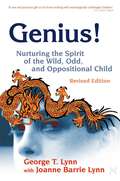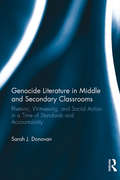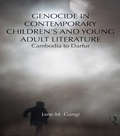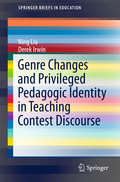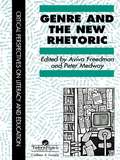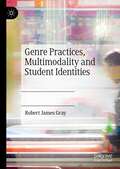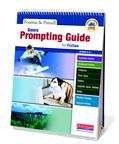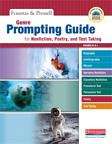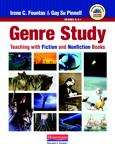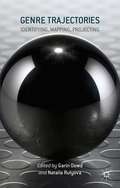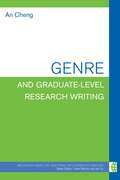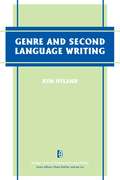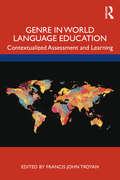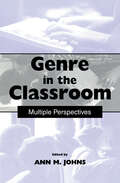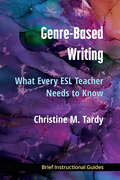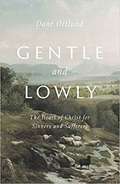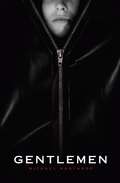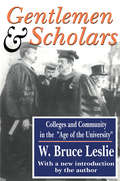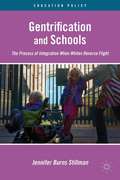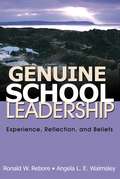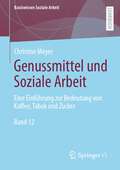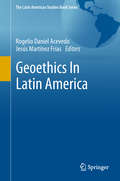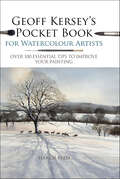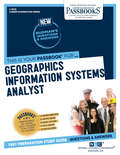- Table View
- List View
Genius!: Nurturing the Spirit of the Wild, Odd, and Oppositional Child – Revised Edition
by George LynnGenius! is an inspiring guide to nurturing the remarkable abilities of "attention different" (AD) children diagnosed with conditions such as autism, Asperger Syndrome, AD/HD, bipolar disorder, or Tourette Syndrome (TS). Drawing on their experiences with their own son, who has TS, George T. Lynn and Joanne Barrie Lynn offer a positive parenting philosophy and successful strategies for creating an affirmative social and emotional environment that unlocks the potential genius in 'neurologically eccentric' children. The authors emphasize the importance of identifying the signs of giftedness, providing the necessary care and mentoring, and using medication with due consideration of its benefits and limitations. They also acknowledge the need to confront the `dark side' of atypical neurology - obsessiveness, self-centredness and hyperactivity - and offer helpful advice on ensuring parents' and carers' own emotional, spiritual, and physical well-being. This book will be an essential tool for parents and carers to help bring out the best in their AD child and help him explore his full potential in life. This revised edition also includes additional material on working with older age groups.
Genocide Literature in Middle and Secondary Classrooms: Rhetoric, Witnessing, and Social Action in a Time of Standards and Accountability
by Sarah DonovanAt the heart of this inquiry into the ethical implications of education reform on reading practices in middle and secondary classrooms, the central question is what is lost, hidden, or marginalized in the name of progress? Drawing on her own experiences as an English teacher during the No Child Left Behind era, the author examines school cultures focused on meeting standards and measurable outcomes. She shows how genocide literature illuminates the ethics of reading and helps teachers and students rethink how literature should be taught in this modern, globalized era and the purposes of education more broadly.
Genocide in Contemporary Children's and Young Adult Literature: Cambodia to Darfur (Children's Literature and Culture)
by Jane GangiThis book studies children’s and young adult literature of genocide since 1945, considering issues of representation and using postcolonial theory to provide both literary analysis and implications for educating the young. Many of the authors visited accurately and authentically portray the genocide about which they write; others perpetuate stereotypes or otherwise distort, demean, or oversimplify. In this focus on young people’s literature of specific genocides, Gangi profiles and critiques works on the Cambodian genocide (1975-1979); the Iraqi Kurds (1988); the Maya of Guatemala (1981-1983); Bosnia, Kosovo, and Srebrenica (1990s); Rwanda (1994); and Darfur (2003-present). In addition to critical analysis, each chapter also provides historical background based on the work of prominent genocide scholars. To conduct research for the book, Gangi traveled to Bosnia, engaged in conversation with young people from Rwanda, and spoke with scholars who had traveled to or lived in Guatemala and Cambodia. This book analyses the ways contemporary children, typically ages ten and up, are engaged in the study of genocide, and addresses the ways in which child survivors who have witnessed genocide are helped by literature that mirrors their experiences.
Genre Changes and Privileged Pedagogic Identity in Teaching Contest Discourse
by Ning Liu Derek IrwinThis book analyzes how the English as a Second Language (ESL) pedagogic genre has been re-contextualized in the Shanghai Foreign Language Education Press National College English Teaching Contest (SFLEP) for presentation to the contest judges and audience. Departing from prior research on contest discourse, it focuses on the role of teaching contests in re-contextualizing educational practices. Moreover, it addresses the processes of genre blurring and solidification at work in new discourse events. The results presented here serve to frame teaching contest discourse in a fuller contextual configuration and will help contest sponsors, participants, and audience members better understand this popular social event and its relations to real-world teaching practices, while simultaneously helping teachers to understand the relevance of such contest practice. Moreover, the research methods will benefit those linguists who are interested in researching other types of event discourses.
Genre In The New Rhetoric (Critical Perspectives On Literacy And Education Ser.)
by Peter Medway Aviva FreedmanSince The Mid-1980s The Notion Of "Genre" Has Been Dramatically Redefined. This redefinition has prompted theorists and scholars alike to analyze the shaping power of language and culture, and the interplay between the individual and the social.; Recent work in genre studies has drawn upon ideas and developments from a wide range of intellectual disciplines including 20th-century rhetoric, literary theory, sociology and philosophy of science, critical discourse analysis, education and cultural studies. In this text, leading theorists reflect and capitalize on the growing interest in genre studies across these allied fields, and examine the powerful implications this reconception of genre has on both research and teaching.
Genre Practices, Multimodality and Student Identities
by Robert James GrayThis book offers a novel framework for describing and understanding student identity via the central concept of "genre practices", developed through an empirical focus on multimodality within the genre of English as a medium of instruction (EMI) undergraduate presentations. The author draws on interviews with undergraduate psychology students and recordings of their presentations to argue that by engaging in the multimodal practices of classroom presentations, presenters (re)produce both the genre and their identities as students. The resulting theory of student identity is widely applicable to tertiary settings, and the methodology described is applicable to the study of practices and identity in a range of other classroom genres. The book will therefore be of interest not only to researchers in EMI and TESOL settings, but also any tertiary-level educational practitioners whose courses include presentations.
Genre Prompting Guide For Fiction
by Gay Su Pinnell Irene C. FountasThe prompts in these ready-reference flip charts are designed to help teachers guide students' inquiry toward explicit understandings of the characteristics of genres. Each prompting guide contains precise language for teaching readers how to focus their thinking and understanding of genres through inquiry. In the Genre Study Prompting Guide for Fiction, Fountas and Pinnell have organized fiction prompts by genre as well as by literary elements and structure. Help you and your students lay the groundwork for a lifetime of literacy exploration and an understanding of the following genres: Contemporary Realistic Fiction Historical Fiction Traditional Literature Folktales Fairy Tales Fables Legends Epics Ballads Myths Modern Fantasy Animal Fantasy Low Fantasy High Fantasy Science Fiction
Genre Prompting Guide For Nonfiction, Poetry, And Test Taking
by Gay Su Pinnell Irene C. FountasThe prompts in these ready reference flip charts are designed to help teachers guide students' inquiry toward explicit understandings of the characteristics of genres. Each prompting guide contains precise language for teaching readers how to focus their thinking and understanding of genre through inquiry. Nonfiction Narrative Nonfiction Biography Autobiography Memoir Expository Nonfiction Persuasive Texts Procedural Texts Hybrid Texts Poetry Test Taking Multiple Choice Questions Constructed Response Questions
Genre Quick Guide K-8+
by Gay Su Pinnell Irene C. FountasThis spiral-bound companion to Genre Study: Teaching with Fiction and Nonfiction Books is designed to help you actively engage students in the exploration of texts so that they can notice and name genre characteristics and construct working definitions that guide their thinking as readers and writers. This handy reference guide contains a master genre chart outlining the definitions, key characteristics (noticings), and a list of mentor texts by genre. In this resource, Irene Fountas and Gay Su Pinnell help you and your students lay the groundwork for a lifetime of literacy exploration and an understanding of the following genres: Fiction Genres Realistic Fiction Historical Fiction Fantasy Traditional Literature folktales fairy tales fables legends epics ballads myths Modern Fantasy animal fantasy low fantasy high fantasy Science Fiction Nonfiction Genres Nonfiction Narrative Nonfiction Biography Autobiography Memoir Expository Nonfiction Persuasive Procedural Hybrid Forms of Poetry
Genre Study: Teaching With Fiction and Nonfiction Books
by Gay Su Pinnell Irene C. FountasGenre Study: Teaching with Fiction and Nonfiction Books is the foundational text of the Genre Study Suite. In exploring Genre Study, Fountas & Pinnell advocate teaching and learning in which students are actively engaged in developing genre understandings and applying their thinking to any genre. It is through using genre understandings that your students think, talk, and read texts with deeper understanding, and write effectively. Genre Study is a professional resource that teachers can use with students to embark on an exciting exploration into the study of genre. View Overview Webinar The Genre Study Suite Bundle is a comprehensive suite of resources that focuses on genre study through inquiry-based learning with an emphasis on reading comprehension and the craft of writing. An inquiry approach engages students in exploring texts so that they can notice and name the characteristics of each genre and construct a working definition that guides their thinking of reading and writing. This suite provides the tools needed to help you and your students lay the groundwork for a lifetime of literacy exploration. The bundle includes: Genre Study: Teaching with Fiction and Nonfiction Books Genre Study Quick Guide a companion to Genre Study: Teaching with Fiction and Nonfiction Books This spiral-bound companion to Genre Study: Teaching with Fiction and Nonfiction Books is designed to help you actively engage students in the exploration of texts so that they can notice and name genre characteristics, and construct working definitions that guide their thinking as readers and writers. This handy reference guide contains a master genre chart outlining the definition, key characteristics, and a list of mentor texts by genre. Genre Prompting Guide for Fiction and Genre Prompting Guide for Nonfiction, Poetry, and Test Taking are comprehensive tools that you can use to explore genres with your students during interactive read-aloud, Reader's workshop, Writer's workshop, guided reading lessons, shared reading, and intervention lessons. The prompts in these ready reference flip charts are designed to help teachers guide students' inquiry toward explicit understandings of the characteristics of genres. In the Genre Prompting Guides, Fountas & Pinnell have organized prompts by genre, and also literary elements and structure. Fiction Genres Realistic Fiction Historical Fiction Traditional Literature (including folktales, fairy tales, fables, epics, legends, ballads, and myths) Modern Fantasy (including simple animal fantasy, low fantasy, high fantasy, and science fiction) Nonfiction Genres Narrative Nonfiction Biography Autobiography Memoir Expository Nonfiction Procedural Texts Persuasive tests Forms of Poetry Lyrical poetry Narrative poetry Free Verse Haiku Limericks Concrete poems Test Taking Multiple Choice Questions Short Answer Questions Extended Response Questions
Genre Trajectories: Identifying, Mapping, Projecting
by Garin Dowd Natalia RulyovaThis book provides a fresh interdisciplinary perspective on genre and identifies developments in genre studies in the early 21st century. Genre approaches are applied to examine a fascinating range of texts including ancient Greek poems, Holocaust visual and literary texts, contemporary Hollywood films, selfies, melodrama, and classroom practices.
Genre and Graduate-Level Research Writing (The Michigan Series on Teaching Multilingual Writers)
by An ChengIn the context of the well-known pedagogical materials for graduate-level writers by Swales & Feak, An Cheng has written a resource that provides support for instructors who have the daunting task of scaffolding graduate writers’ efforts to navigate discipline-specific research genres--genres that may be unfamiliar to instructors themselves. Genre and Graduate-Level Research Writing is grounded in genre-based theory and full of best practices examples. The book opens by presenting the case for the use of genre in graduate-level research writing and by examining rhetorical consciousness-raising and its ties to genre. Unique to the volume is a thorough analysis of the materials designed to teach genre and research writing—focused on the textbooks of Swales & Feak (e.g., Academic Writing for Graduate Students) and similar texts. Other chapters provide examples of discovery-based genre tasks, evaluative methods for assessing discipline-specific writing, and techniques for becoming a more confident instructor of graduate-level research writing.
Genre and Second Language Writing
by Ken HylandSecond language students not only need strategies for drafting and revising to write effectively, but also a clear understanding of genre so that they can appropriately structure their writing for various contexts. Over that last decade, increasing attention has been paid to the notion of genre and its central place in language teaching and learning. Genre and Second Language Writing enters into this important debate, providing an accessible introduction to current theory and research in the area of written genres-and applying these understandings to the practical concerns of today's EFL/ESL classroom. Each chapter includes discussion and review questions and small-scale practical research activities. Like the other texts in the popular Michigan Series on Teaching Multilingual Writers, this book will interest ESL teachers in training, teacher educators, current ESL instructors, and researchers and scholars in the area of ESL writing.
Genre in World Language Education: Contextualized Assessment and Learning
by Francis John TroyanIdeal for methods and foundational courses in world languages education, this book presents a theoretically informed instructional framework for instruction and assessment of world languages. In line with ACTFL and CEFR standards, this volume brings together scholarship on contextualized, task-based performance assessment and instruction with a genre theory and pedagogy to walk through the steps of designing and implementing effective genre-based instruction. Chapters feature step-by-step lesson designs, models of performance assessment, and a wealth of practical and research-based examples on how to make languages explicit to students through a focus on genre. Including sections on Arabic, French, Spanish, Italian, and other major world languages, this book demonstrates how to effectively teach and assess world languages in the classroom.
Genre in the Classroom: Multiple Perspectives
by Ann M. JohnsFor the first time, the major theoretical and pedagogical approaches to genre and related issues of social construction are presented in a single volume, providing an overview of the state of the art for practitioners in applied linguistics, ESL/EFL pedagogies, rhetoric, and composition studies around the world. Unlike volumes that present one theoretical stance, this book attempts to give equal time to all theoretical and pedagogical camps. Included are chapters by authors from the Sydney School, the New Rhetoric, and English for Specific Purposes, as well as contributions from other practitioners who pose questions that cross theoretical lines. Genre in the Classroom: *includes all of the major theoretical views of genre that influence pedagogical practice; *takes an international approach, drawing from all parts of the world in which genre theory has been applied in the classroom--Australia, Canada, Hong Kong, the Middle East, the United States; *features contributors who are all both theorists and classroom practitioners, lending credibility and authenticity to the arguments; *combines theory and practice in every chapter, showing how particular theoretical views influence classroom practice; *grounds pedagogical practices in their own regional and theoretical histories; *openly discusses problems and questions that genre theory raises and presents some of the solutions suggested; and *offers a concluding chapter that argues for two macro-genres, and with responses to this argument by noted genre theorists from three theoretical camps.
Genre-Based Writing: What Every ESL Teacher Needs to Know
by Christine TardyIn Genre-Based Writing, author Christine Tardy defines genre and genre-based writing instruction and the five principles of a genre-based pedagogy. She then explains how to design genre-based writing activities. By discussing the genre-related practices and social and rhetorical aspects of genre, she is able to outline strategies for exploring rhetorical moves and playing with genre form in the classroom. In addition, the book provides general tips for bringing a genre approach into the writing classroom as well as several application activities and specific suggestions for classroom tasks.
Gentle And Lowly: The Heart Of Christ For Sinners And Sufferers
by Dane C. OrtlundChristians can easily feel that Jesus is perpetually disappointed and frustrated, maybe even close to giving up on them. They know what Christ has done for them―but who is he? How does he feel about his people amid all their sins and failures? In Matthew 11, Jesus describes himself as “gentle and lowly in heart,” longing for his people to find rest in him. This book reflects on his words, diving deep into Bible passages that speak of Christ’s affections for sinners and encouraging believers as they journey, weary and faltering, toward heaven.
Gentlemen
by Michael NorthropWhen three teen-aged boys suspect that their English teacher is responsible for their friend's disappearance, they must navigate a maze of assured clues, fraying friendships, violence, and Dostoevsky's Crime and Punishment before learning the truth. Gritty, fast-paced, and brutally real, this debut novel takes an unflinching look at what binds friends together -- and what can tear them apart.
Gentlemen and Scholars: College and Community in the Age of the University
by W. Bruce LeslieHistorians have dubbed the period from the Civil War to World War I "the age of the university," suggesting that colleges, in contrast to universities, were static institutions out of touch with American society. Bruce Leslie challenges this view by offering compelling evidence for the continued vitality of colleges, using case studies of four representative colleges from the Middle Atlantic region u Bucknell, Franklin and Marshall, Princeton, and Swarthmore. A new introduction to this classic reflects on his work in light of recent scholarship, especially that on southern universities, the American college in the international context, the experience of women, and liberal Protestantism's impact on the research university.According to Leslie, nineteenth-century colleges were designed by their founders and supporters to be instruments of ethnic, denominational, and local identity. The four colleges Leslie examines in detail here were representative of these types, each serving a particular religious denomination or lifestyle. Over the course of this period, however, these colleges, like many others, were forced to look beyond traditional sources of financial support, toward wealthy alumni and urban benefactors.This development led to the gradual reorientation of these schools toward an emerging national urban Protestant culture. Colleges that responded to and exploited the new currents prospered. Those that continued to serve cultural distinctiveness and localism risked financial sacrifice. Leslie develops his argument from a close study of faculties, curricula, financial constituencies, student bodies, and campus life. The book will be valuable to those interested in American history, higher education, as well as the particular institutions studied."This book continues the story started by Veysey's Emergence of the American University. Its innovative approach should encourage scholars to study colleges and universities as parts of local communities rather than as freestanding entities. Leslie's findings will substantially revise currently accepted accounts of the history of education in the late nineteenth century."--Louise L. Stevenson, Franklin and Marshall College
Gentrification and Schools
by Jennifer Burns StillmanThrough fifty-two interviews with New York City parents in gentrifying neighborhoods, this book examines the school choice process to determine how, through the compounding effect of these parents' many individual choices, a segregated urban school in a gentrifying neighborhood is able to transform into an integrated school.
Genuine School Leadership: Experience, Reflection, and Beliefs
by Ronald W. Rebore Angela L. WalmsleyThis insightful guide explores the influence of values, experience, and beliefs on leadership practices and provides examples and reflective questions for exercising authentic, moral leadership.
Genussmittel und Soziale Arbeit: Eine Einführung zur Bedeutung von Kaffee, Tabak und Zucker (Basiswissen Soziale Arbeit #12)
by Christine MeyerDas Lehrbuch bietet einen Einstieg in Fragen rund um drei für Soziale Arbeit bedeutende Genussmittel: Kaffee, Tabak und Zucker. Fachkräfte der Sozialen Arbeit sind wiederkehrend in ganz verschiedenen Perspektiven mit ihrem Konsum befasst. Neben gesundheitsbezogenen Fragen aufgrund der gesellschaftlichen Ächtung von (zu viel) Zucker und Tabak lassen sich an ihnen bedeutende sozialpädagogische Fragen aufmachen, die jenseits gesundheitsbezogener, z. B. Fragen der Gastlichkeit, der Gestaltung professionell angenehmer Atmosphären, der Verteilung sowie des offenen Zugangs betreffen. In nahezu jedem sozialpädagogischen Setting werden täglich Verzehrsituationen bzw. Mahlzeiten geplant, angeboten und durchgeführt. Für die Soziale Arbeit über die Bereitstellung ausreichender und ausgewogener Ernährung hinaus verantwortlich ist für die Bereitstellung von Genussmitteln und deren Konsum vor dem Hintergrund gesellschaftlich relevanter eingelebter Kulturen und Traditionen. Das Lehrbuch ermöglicht, über den Gesamtzusammenhang von Genussmitteln im Zusammenhang mit Ernährung als grundlegende und voraussetzungsvolle Bedingungen sozialpädagogischen Denkens und Handelns reflektieren zu können. In allen Handlungsfeldern der Sozialen Arbeit sind Genussmittel auf unterschiedlichen Ebenen und mit verschiedenen Funktionen wiederkehrend Thema und können als täglich zu bewältigende Herausforderung eingeschätzt werden. Diese grundlegende Einführung ermöglicht eine Bewusstmachung und damit auch fachliche Reflexionsmöglichkeiten für den individuellen und gesellschaftlich verantwortlichen sozialpädagogischen Umgang von Fachkräften mit Fragen rund um die insbesondere für Soziale Arbeit bedeutenden Genussmittel Kaffee, Tabak und Zucker.
Geoethics In Latin America (The Latin American Studies Book Series)
by Rogelio Daniel Acevedo Jesús Martínez FríasThis book studies geoethics in Latin America and offers comprehensive research on geoethics and geoeducation. Its respective chapters explore geoethics in relation to UNESCO geoparks, mining activities in Latin America, natural hazards and risk management. Geoethics is a key discipline in the field of Earth and Planetary Sciences, and not only includes scientific, technological, methodological and social-cultural aspects, but also addresses the need to consider appropriate protocols, scientific integrity issues and a code of good practice when studying the abiotic world.The position of Latin America’s recently created geoethics associations is based on protection of the environment, together with a reassurance that the balance of nature and the rights of human beings to enjoy it will be preserved.
Geoff Kersey’s Pocket Book for Watercolour Artists: Over 100 Essential Tips to Improve Your Painting
by Geoff KerseyGeoff Kersey shares his expertise in this book packed full of tips for watercolour painters. Learn all you need to know, from what to buy, composing a painting and mastering techniques such as wet into wet and dry brush work, to how to paint skies, water, trees, buildings and more. The tips are clearly explained and illustrated through artwork and step-by-step photographs.This title was previously published as Geoff's Top Tips for Watercolour Artists. In this new, easy-to-use flexibinding format with an updated design, the books in the Watercolour Artists’ Pocket Books series bring you the best tips from some of Search Press's leading authors.
Geographic Information System Analyst: Passbooks Study Guide (Career Examination Series)
by National Learning CorporationThe Geographic Information System Analyst Test Passbook® prepares you for your test by allowing you to take practice exams in the subjects you need to study. It provides hundreds of questions and answers in the areas that will likely be covered on your upcoming exam.
